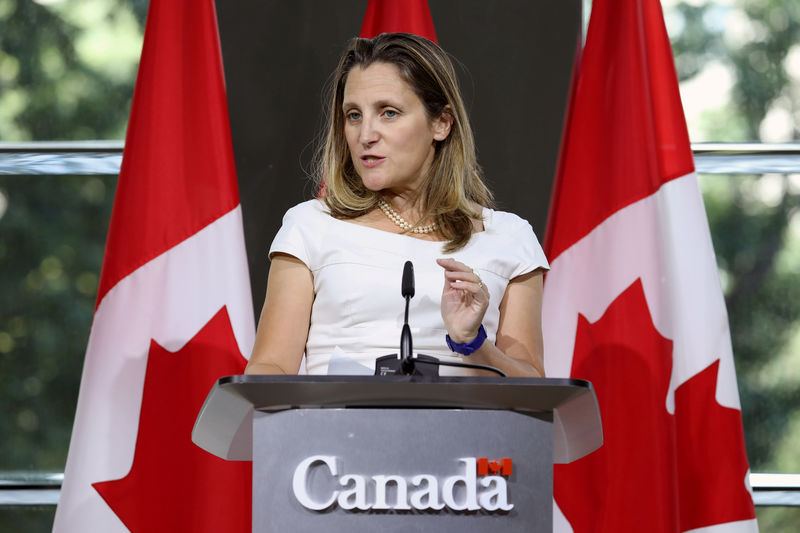 © Reuters. FILE PHOTO: Canadian Foreign Minister Chrystia Freeland takes part in a news conference in Washington
© Reuters. FILE PHOTO: Canadian Foreign Minister Chrystia Freeland takes part in a news conference in WashingtonBy David Ljunggren
WASHINGTON (Reuters) – Canada and the United States showed scant sign of being close to striking a deal on revamping the trilateral NAFTA that underpins $1.2 trillion in annual trade, as Canadian sources played down talk of a U.S. quota on autos.
Canada says it does not feel bound by a U.S.-imposed deadline for the end of September to conclude a deal.
While multiple deadlines have been and gone during the more than year-long negotiations to renew NAFTA, pressure on Canada to agree to a deal is growing, partly to push it through Congress before Mexico’s new government takes office on Dec. 1.
Trump, who struck a side-deal with third NAFTA member Mexico last month, has threatened to exclude Canada if necessary. He also warned of tariffs on Canadian autos exports.
Canadian Foreign Minister Chrystia Freeland has held talks with U.S. Trade Representative Robert Lighthizer in each of the last four weeks and on Thursday opened another round.
A senior Canadian labor leader briefed on the negotiations told Reuters that an immediate breakthrough was unlikely.
“We’ve made progress according to the briefing I got but of course there is no agreement and there are some predictable issues that need to be resolved,” said Hassan Yussuff, president of the Canadian Labour Congress.
Yussuff said a standoff over how to settle disputes was “a critical issue”. The two sides are also at odds over U.S. demands for more access to Canada’s dairy market.
The uncompromising tone by Trump, who came to power last year threatening to tear up NAFTA unless major changes were made to a pact he blames for the loss of manufacturing jobs, has stoked market fears about the potential damage to three nations’ highly integrated economies.
The Globe and Mail newspaper on Thursday reported that U.S. negotiators want Ottawa to agree to capping its auto exports to the United States at 1.7 million vehicles a year, something that Canadian industry sources dismissed as unacceptable.
“Canada absolutely … would not agree to a self-imposed quota,” said a source familiar with the talks.
Separately, a Canadian source directly familiar with the negotiations said “we have not discussed a cap”.
As part of the bilateral deal between Mexico and the United States, the Mexican side agreed to limit its exports of autos and SUVs.
Freeland plans to return to Canada on Thursday ahead of a two-day meeting of female foreign ministers she is co-hosting in Montreal on Friday and Saturday. Next week she will be in New York for a United Nations session.
Fusion Media or anyone involved with Fusion Media will not accept any liability for loss or damage as a result of reliance on the information including data, quotes, charts and buy/sell signals contained within this website. Please be fully informed regarding the risks and costs associated with trading the financial markets, it is one of the riskiest investment forms possible.
Source: Investing.com




























